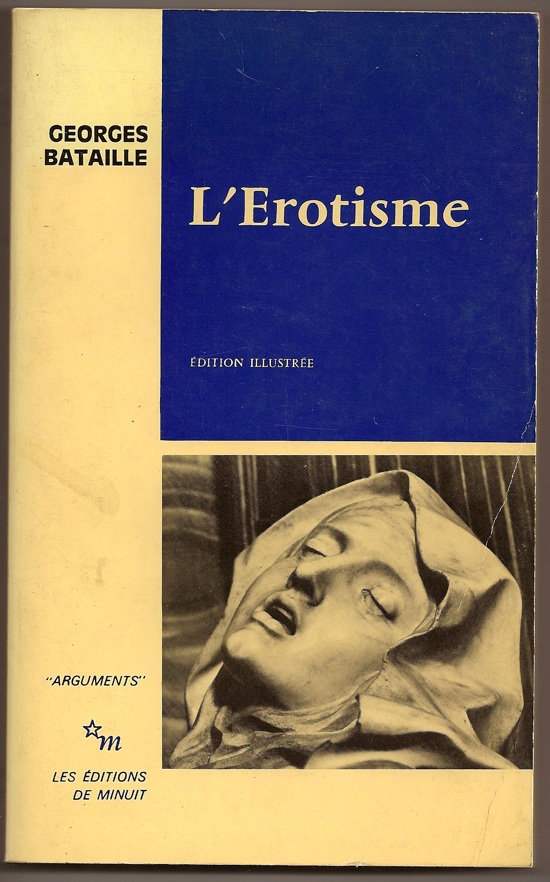Georges Bataille: Erotism: Death and Sensuality (1957–) [FR, ES, EN, IT, PT]
Filed under book | Tags: · death, ecstasy, eroticism, language, psychology, religion, sex, sexuality

Taboo and sacrifice, transgression and language, death and sensuality—Georges Bataille pursues these themes with an original, often startling perspective. He challenges any single discourse on the erotic. The scope of his inquiry ranges from Emily Bronte to Sade, from St. Therese to Claude Levi-Strauss and Dr. Kinsey; and the subjects he covers include prostitution, mythical ecstasy, cruelty, and organized war. Investigating desire prior to and extending beyond the realm of sexuality, he argues that eroticism is “a psychological quest not alien to death.”
First published in French as L’Érotisme, Éditions de Minuit, 1957.
This edition published within Oeuvres complètes. Tome 10 (pp 1-270), together with Le procès de Gilles de Rais and Les larmes d’Éros.
Publisher Gallimard, 1987
734 pages
English edition
Translated by Mary Dalwood
The first edition in English was published as Death and Sensuality: a Study of Eroticism and the Taboo, Walker and Company, NY, 1962.
Publisher City Lights Books, San Francisco, 1986
ISBN 0872861902, 9780872861909
280 pages
Review (Mark Price, Philosophy Now)
L’Érotisme (French, 1957/1987). Alt link.
El erotismo (Spanish, transcript, trans. María Luisa Bastos, 1960)
Erotism: Death & Sensuality (English, trans. Mary Dalwood, 1962/1986)
L’erotismo (Italian, transcript, trans. Adriana dell’Orto, 1962)
O erotismo (Portuguese, trans. Antonio Carlos Viana, 1987)
Peter Sloterdijk: You Must Change Your Life: On Anthropotechnics (2009/2012)
Filed under book | Tags: · anthropology, anthropotechnics, christianity, education, enlightenment, history of philosophy, modernity, philosophy, religion

“In his major investigation into the nature of humans, Peter Sloterdijk presents a critique of myth – the myth of the return of religion. For it is not religion that is returning; rather, there is something else quite profound that is taking on increasing significance in the present: the human as a practising, training being, one that creates itself through exercises and thereby transcends itself. Rainer Maria Rilke formulated the drive towards such self-training in the early twentieth century in the imperative ‘You must change your life’.
In making his case for the expansion of the practice zone for individuals and for society as a whole, Sloterdijk develops a fundamental and fundamentally new anthropology. The core of his science of the human being is an insight into the self-formation of all things human. The activity of both individuals and collectives constantly comes back to affect them: work affects the worker, communication the communicator, feelings the feeler.
It is those humans who engage expressly in practice that embody this mode of existence most clearly: farmers, workers, warriors, writers, yogis, rhetoricians, musicians or models. By examining their training plans and peak performances, this book offers a panorama of exercises that are necessary to be, and remain, a human being.”
First published in German as Du mußt dein Leben ändern, Suhrkamp, Frankfurt am Main, 2009.
Translated by Wieland Hoban
Publisher Polity Press, 2012
ISBN 0745649211, 9780745649214
500 pages
review (Keith Ansell-Pearson, LA Review of Books)
review (Michael Hübl, Metropolis M)
commentary (Bruce Sterling, Wired)
commentary (Sanne van der Hout)
Henrik Bogdan, Martin P. Starr (eds.): Aleister Crowley and Western Esotericism (2012)
Filed under book | Tags: · esotericism, magick, mysticism, occultism, occultural studies, religion, sexuality

Henrik Bogdan and Martin P. Starr offer the first comprehensive examination of one of the twentieth century’s most distinctive occult iconoclasts. Aleister Crowley (1875-1947) was a study in contradictions. He was born into a Fundamentalist Christian family, then educated at Cambridge where he experienced both an intellectual liberation from his religious upbringing and a psychic awakening that led him into the study of magic. He was a stock figure in the tabloid press of his day, vilified during his life as a traitor, drug addict and debaucher; yet he became known as the perhaps most influential thinker in contemporary esotericism.
The practice of the occult arts was understood in the light of contemporary developments in psychology, and its advocates, such as William Butler Yeats, were among the intellectual avant-garde of the modernist project. Crowley took a more drastic step and declared himself the revelator of a new age of individualism. Crowley’s occult bricolage, Magick, was a thoroughly eclectic combination of spiritual exercises drawing from Western European ceremonial magical traditions as practiced in the nineteenth-century Hermetic Order of the Golden Dawn. Crowley also pioneered in his inclusion of Indic sources for the parallel disciplines of meditation and yoga. The summa of this journey of self-liberation was harnessing the power of sexuality as a magical discipline, an instance of the “sacrilization of the self” as practiced in his co-masonic magical group, the Ordo Templi Orientis. The religion Crowley created, Thelema, legitimated his role as a charismatic revelator and herald of a new age of freedom under the law of “Do what thou wilt.”
The influence of Aleister Crowley is not only to be found in contemporary esotericism-he was, for instance, a major influence on Gerald Gardner and the modern witchcraft movement-but can also be seen in the counter-culture movement of the late 1960s and early 1970s, and in many forms of alternative spirituality and popular culture. This anthology, which features essays by leading scholars of Western esotericism across a wide array of disciplines, provides much-needed insight into Crowley’s critical role in the study of western esotericism, new religious movements, and sexuality.
Publisher Oxford University Press, 2012
ISBN 0199863091, 9780199863099
406 pages

